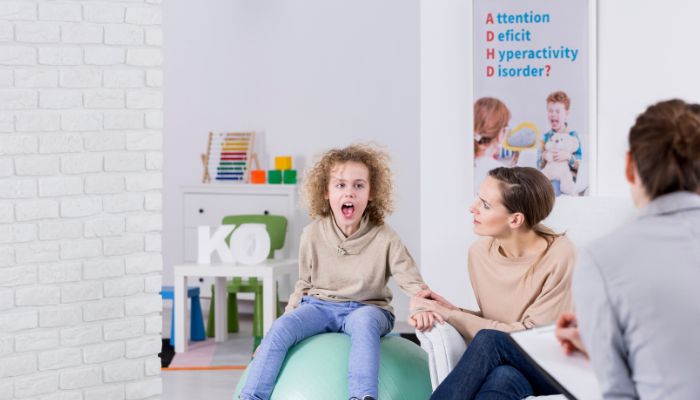Attention Deficit Hyperactivity Disorder (ADHD) is characterized primarily by difficulties in self-regulation and so-called executive functions. In practice, this means that children with ADHD find it difficult to control their own behavior, and therefore to organize, plan and be goal-oriented, as well as to control their impulses. These difficulties cause a variety of challenges that involve not only the children, but also those who are in their care. Let’s look at some of these challenges:

Common challenges
One main challenge is the misinterpretation of the behaviors of children with ADHD. Their difficulty in complying with adult requests or adhering to routines may lead us to believe that children do not want to obey. However, most of the time, kids with ADHD simply don’t manage to do it. It’s not that they don’t want to sit still, or that they lose items from their school pencil case because they don’t care. Rather, it is likely that they have felt an impulse to move, or discomfort, or have been distracted by something that happened near them, and so they engage in the behaviors for which we then call their attention.
Difficulties in concentrating and focusing cause children to be easily distracted, make careless mistakes, constantly switch activities or seem unable to stick to time-consuming tasks. Whereas hyperactivity and impulsivity are what cause them to fidget or talk excessively, fail to wait for their turn in play, interrupt while others are talking, or look the wrong way at danger. On a day-to-day basis, these difficulties cause complications in routine activities, such as getting to bed at night, getting ready for school on time, participating in social events or simply going to places such as shopping.
While caring for a child with ADHD can be challenging, effectively managing their symptoms can have concrete benefits, such as reducing the severity of the disorder and avoiding the development of more serious problems over time. Here are some things we can do to tackle these challenges and help our children thrive:
5 USEFUL TIPS TO Managing ADHD in Children
#1 Get informed
The first step to becoming involved is to learn about ADHD. The more you know, the better: it will enable you to understand your child, communicate with healthcare professionals and choose the most appropriate treatments. You will also be better able to understand the expected course of ADHD as your child grows older and, if your child takes ADHD medication, you will better understand the reasons and what effects to expect from it.
Connecting with others in local support groups can serve a dual function: on the one hand, you can learn new information about ADHD and coping strategies. But these spaces can also help you gain support and awareness, and prevent you from feeling that you are coping on your own.
#2 Establish healthy habits
Healthy habits will help your child not only feel good, but also minimize the symptoms of ADHD. ADHD and sleep problems often form a vicious circle: hyperactivity leads to less sleep, and less sleep exacerbates ADHD symptoms. That’s why it’s important to build a sleep routine that starts early and stick to it consistently. For example, avoid over-stimulating activities in the hours before bedtime, dim the lights and noises in the house as night falls, and get your child into bed at the same time every night and up at the same time every morning.
It is also important to help your child eat a balanced diet, for example by avoiding foods that contain additives or caffeine, and making sure that your child does not skip meals during the day. And make sure your child gets plenty of physical activity during the day so that they spend energy and reach bedtime tired. You can also find online resources and recommendations on the best mental health apps to build healthy habits.

#3 Plan your day
One way to help your child stick to daily habits such as getting ready for school is to help them know clearly what to expect and break it down into structured steps. Establishing routines can make a big difference for your child: knowing exactly when things will happen, or always following the same steps, will make it harder for them to forget or get distracted by other things.
Anticipation and predictability can be difficult to build, but it will provide your child with a structure that makes things easier. To achieve this, some things you can do are to set clear expectations, communicate with your child in advance of future changes in routine, and support them as they try to stick to their daily habits.
#4 Give clear directions
Inattention, ambiguous or unclear directions may be difficult for your child to follow. Or, if a direction includes too much information, it may lead to information overload and your child may not be able to process it, or may be distracted by things going on around them.
In general, children with ADHD find it easier to follow simple directions with concrete information. Making contact with your child or placing a gentle hand on their shoulder as you talk to them can help to get their attention. Also, giving directions that suggest what you expect them to do (“run slower”) rather than what you don’t want them to do (“don’t run”) helps your child to better understand what you expect of them.
#5 Build your child’s confidence
Due to impulsivity and hyperactivity, children with ADHD often receive more negative feedback and negative attention from adults. This, in the long run, can damage their self-esteem. Therefore, part of your challenge as a parent is to show your child that they have a lot to be proud of, and that they are worthy of other people’s affection. To do this, you can start by setting aside a daily special time with your child and committing to making it a time of positive interaction.
One way to do this is to make a conscious effort to notice when your child is behaving well or paying attention, and use this time to praise them. It doesn’t need to be a big achievement – the important thing is that your child knows you are proud of them, and that they learn what behaviors you value.
Conclusions
Parenting a child with ADHD is not an easy task. In addition to patience, it requires us to develop new skills and different strategies to tackle the challenges associated with our child’s hyperactivity, impulsivity and inattention.
Fortunately, there are strategies such as those described above, that can help you improve the quality of your child’s life, your own, and your relationship with each other. Incorporate one strategy at a time, and practice them daily (even if it’s just a little bit every day!). With patience and hard work, they can help you regain some control over your child’s ADHD.

Lifebing is driven by an unrelenting passion for promoting health and well-being, our team is wholly committed to curating exceptional content and immersive experiences.
